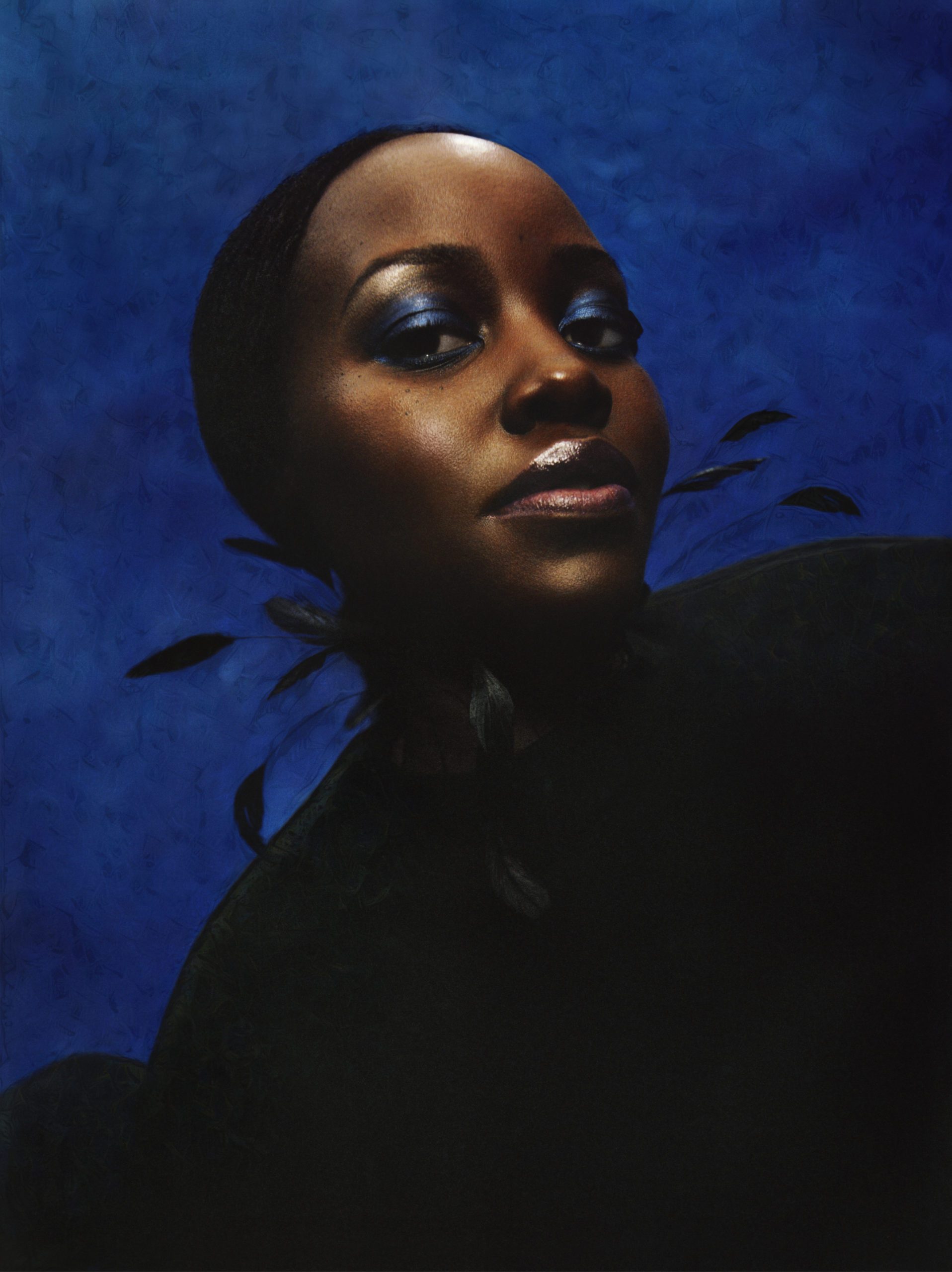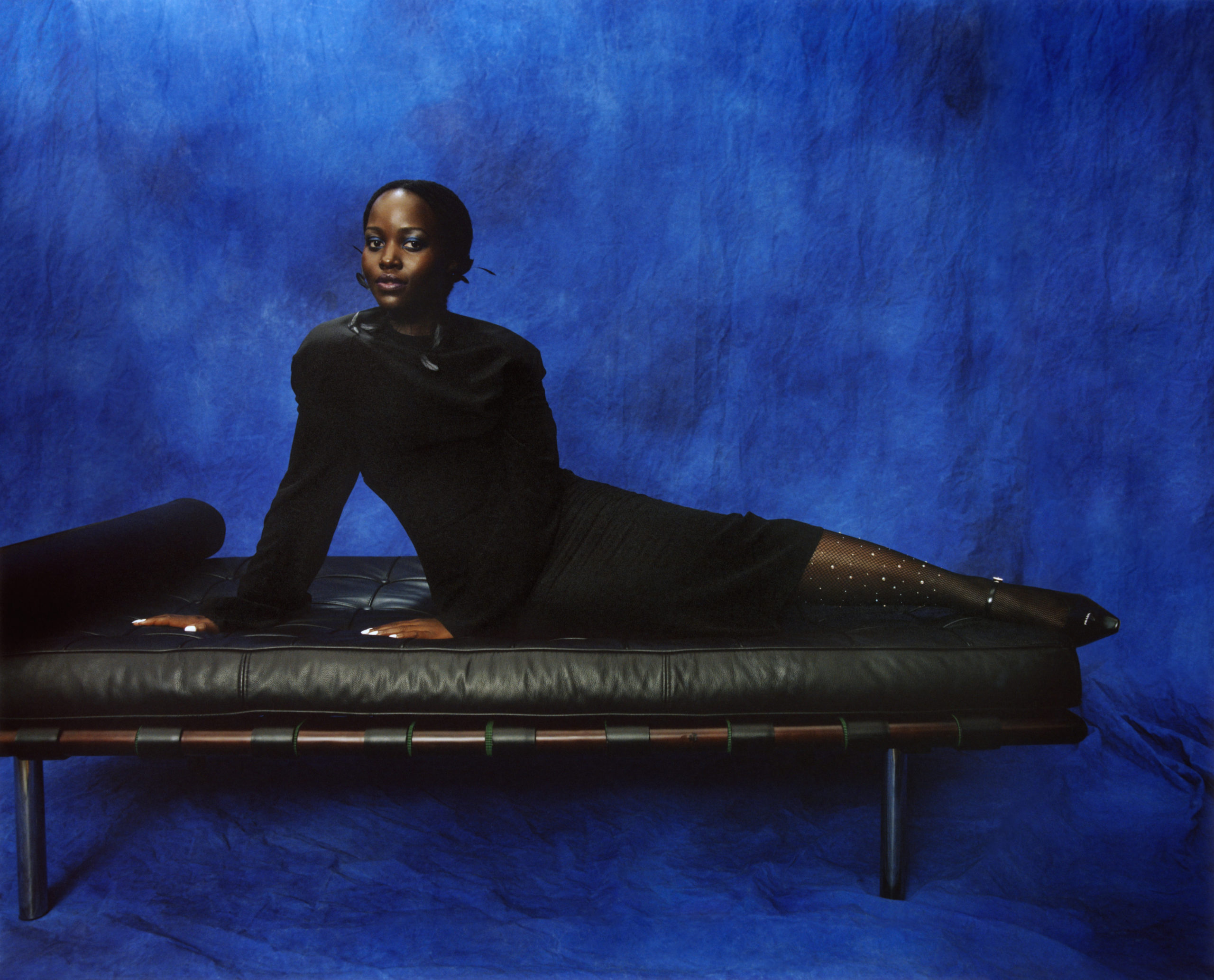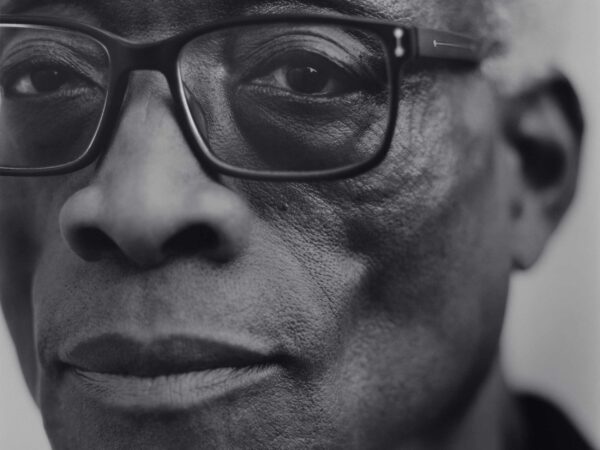
Upon her return to the ‘Black Panther’ franchise, the celebrated actor reflects on healing alongside her character for Document’s Winter/Resort 2023 issue
In the years since her transition from the stage to the screen, actor Lupita Nyong’o has played a key role in much-lauded movies exploring Black identity and Black stories. Each of her characters challenges the traditions of cinema: her Oscar-winning breakthrough as Patsey in Steve McQueen’s beautiful and brutal 12 Years a Slave; her chilling portrayal of Adelaide and her doppelgänger in Jordan Peele’s Us; and her layered depiction of War Dog Nakia in Black Panther, a film that recontextualizes the tropes of superhero cinema by intertwining them with themes of Black power.
Nyong’o experienced a truly global upbringing; born in Mexico to Kenyan parents, she was given a Spanish name and grew up speaking multiple languages, which she leverages as a means of building her library of perspectives to inhabit. “There are those untranslatable locutions, you know—incredibly precious and specific to a language,” she muses. Her affinity for accumulating worldviews has served her in the breadth of characters she’s taken on, their nuance indicative of a revolutionary period of Black cinema and screenwriting.
In 2017, Get Out gave us Black horror. In 2019, Queen & Slim gave us Black Bonnie and Clyde. More recently, Black people were centered in the Western genre, too, like in 2021’s The Harder They Fall. But Ryan Coogler’s Black Panther was different. It was a reckoning—a force that addressed everything from colonialism and reparations to the tension between tradition and change. What truly cemented the film as legendary, however, was the talent it showcased—with mesmerizing performances from Nyong’o and lead actor Chadwick Boseman. A Black Panther sequel felt inevitable before the credits had even rolled. And then, in 2020, Boseman passed away from colon cancer.
In an age marked by pandemics and school shootings and police violence—experienced en masse on phone screens—grief is often a collective experience. The death of Boseman affected people across the world. But for Nyong’o, that grief was personal. What does it mean to mourn in such a public way? How do you go back to inhabiting a character who turns out to be further along in their journey through grief than you are? How can you walk in your own truth while feigning a sage-like inner tranquility?
“I loved to play make-believe. I loved [having] an emotional effect on my parents and other adults,” Nyong’o says, recalling her early affinity for acting. “There was a seduction to that which I fell for.” Taking a cue from Boseman’s pursuit of excellence, and the way he would never use personal suffering as an excuse to give anything less than everything (“he would give 150 percent to his work, and he was committed to make-believe with such truth and tenacity,” she says). Nyong’o folded her character’s impossible self-possession into her own grief, forging new paths for processing emotional pain, and giving the world a vehicle for mourning its shared loss.
Hannah Ongley: How are you feeling about the Black Panther release? I’ve been scrolling through the latest YouTube comments, and everyone is just so excited.
Lupita Nyong’o: I’m feeling good about it. It’s encouraging to see how excited people are. You can feel it—it’s rising. It’s reminiscent of the first film, which was a fun ride, for sure.
Hannah: Do you engage with the hype at all? Or is it a little overwhelming?
Lupita: [Laughs] I don’t think I have a choice! I have to engage with it. It’s happening everywhere. You know, I’m pretty busy generating material, so I don’t really have time to go down the rabbit hole. But I do hear it, I witness it in passing.
Hannah: I would love to hear about your experience coming into this film—of transitioning from the original, and how you approached that. What were your impressions when you first read the script?
Lupita: Well, the first time I read the script wasn’t the first time I heard the story. Ryan [Coogler] calls us individually to walk us through the plot, so we get that human, oral [version]. I’d been dreading that call. I just didn’t know how we’d move forward without Chadwick. I was anxious about how the storytelling would respond to his death. What Ryan walked me through was such a heartfelt tribute to Chadwick—T’Challa has died at the beginning of our story, and the characters are all contending with that loss.
Hannah: I read an interview where you said you were frustrated, having to portray this character who didn’t represent how you felt in real life.
Lupita: When we meet Nakia, she’s lost her one true love and is coming to terms with that—but she’s progressed a little bit more in her journey through grief than the other characters. She’s in a way more accepting place than I was, when I played her. And that was tough, to [depict] a kind of wisdom I didn’t possess at the time. I would have much preferred to be chaotic, because that’s how I felt—I felt more raw than Nakia is in our story. But, you know, having to play a character who sees things as sagely as she does—who is as spiritually centered as she seems to be—ended up being very therapeutic.
“You want to appease folks, but there is a difference between being kind and being nice. I am in pursuit of kindness.”
Hannah: It must involve a bit of personal work, outside of the filming process. Could you speak about what you learned from Chadwick? There’s a quite powerful quote from the trailer, about how only the most broken people make great leaders.
Lupita: I haven’t really thought about that [quote] in relation to Chadwick. But I’ve learned a lot from him. And in preparing for this role, I was thinking about him a lot: about the nature of his strength, despite the fact that his body was failing him. He would always give 150 percent to his work, and he was committed to make-believe with such truth and tenacity, even. He was in pursuit of excellence with every role; he never used his personal ailments as an excuse. And he never imposed himself on other people.
I never felt like Chadwick was judging me, or asking me to be anyone but myself. When I think about what I can take from him, moving forward, it’s about being true to myself as much as he was true to himself. I was inspired by his quiet leadership. He wasn’t overt in the way he led the set. He kept to himself. He was very friendly, but he was focused, and he would preserve his energy and use it at the right time. When I thought about coming back to this film without him, I committed to being open-hearted and present, and operating with flow, because there are a lot of unpredictable things that happen on a movie set. It’s so easy to get discombobulated. I think it made my experience a lot more joyful, being really porous to the people I was working with. And I ended up learning a lot.
Hannah: You are a role model to a lot of girls and women. Has that changed the way that you think about yourself? Are you comfortable with that role?
Lupita: I’ve always been comfortable with that role—I’ve never fought it. It goes with the territory, being one of the few among many.
My pursuit of authenticity has been a long one. I’ve always tried to walk in my truth. But
sometimes, we can fail to hear the truth—about how we feel, and what we want. I do a better job of interrogating how I feel now, and reflection is the ultimate way to do that. I listen to myself more deliberately. Chadwick, he wasn’t about pleasing everybody, you know? There were times when people would ask him to smile, and he didn’t feel like smiling. And I thought, ‘Wow, what a courageous man.’
Hannah: I think most women can relate to that.
Lupita: Exactly. And you want to appease folks, but there is a difference between being kind and being nice. I am in pursuit of kindness.
Hannah: Kindness is harder. And sometimes, it doesn’t appear nice to other people.
Lupita: Yeah, and that’s okay.
I think I’m attracted to things that are in line with that [idea of] mentorship. It’s about listening to your inner navigation system, and following it.
“Having that early exposure to language really gives you an appreciation for nuance. I witnessed a lot of how culture is embedded in the way you say things.”
Hannah: Tech and science are recurring interests for your characters, which is inspiring, especially for young Black girls—to envision themselves in those disciplines. Are these subjects you feel passionately about?
Lupita: Well, I was drawn to Super Sema, for example, because it is a pioneering show, right? She’s the first African kid superhero who is in an animated series—a girl whose superpower is STEAM.
Now, I was not particularly good at science as a kid. And I was not encouraged to be good at it. A lot more attention was put on the boys. It was never overtly said that girls are not good at science—I don’t remember that. But I don’t remember feeling welcome. My brain would not grasp this stuff. And my teachers didn’t try too hard to reach me. A show like Super Sema, which introduces scientific ideas to young kids, is a great way to shift the paradigm of how they approach STEAM. It says, ‘This is a venue, this is an avenue for you to excel in, this is for you, too.’ I believe that STEAM is an extremely important part of our modern life, and will continue to be. To equip kids with it today is to prepare them for tomorrow.
Hannah: It seems like language might be more your thing. You speak four—did you learn them naturally?
Lupita: Yeah, I learned that with my body. And I have extremely learned parents. My father was a professor of political science and my mother was an editor. I grew up in a very scholarly home—we have books lining the walls from top to bottom. Language was revered. I mean, reading was expected and encouraged, but I didn’t enjoy it. I still don’t.
Hannah: That surprises me.
Lupita: It’s like, I don’t particularly enjoy brushing my teeth—but I’ll do it. Because I know what’s good for me. I do enjoy language. I consider myself a linguaphile. I had a great language teacher in school, and I fell in love with structure and punctuation. Really, my mother bullied me into it—she’d make me do my homework more than once. She would correct it, and then I’d have to sit down and do it again. It made me a grammar fiend—like, I am a stickler for punctuation. I am known to send a text message, find a spelling mistake, and send it again with the corrections. I delight in language. I find it beautiful, and extremely expressive. I still don’t like to read.
“As human beings, we have a very short memory, and an even shorter attention span. It is important to preserve symbols of times gone by. They’re evidence of things that have occurred—things we must do everything to ensure will not occur again.”
Hannah: Given that you are multilingual, and that there are so many things about language that are so specific to culture, do you think that’s part of the appeal?
Lupita: In Kenya, we have two national languages: English and Swahili. I come from the Luo tribe, so the first language I ever uttered was Luo. And I was born in Mexico—my parents sent me there to learn Spanish as a teenager. Having that early exposure to language really gives you an appreciation for nuance. I witnessed a lot of how culture is embedded in the way you say things.
It really does open you up to more humanity, the more languages you speak. There are those untranslatable locutions, you know—incredibly precious and specific to a language—and it’s so ticklish when you finally understand them. It’s like finding treasure. I love to exercise my brain linguistically.
Hannah: You’ve done projects that are quite hyperlocal in setting, like In My Genes and Super Sema. In such a globalized era, what is the importance of telling stories about very specific places and cultures?
Lupita: When I’m writing, I tell stories about what I know. Those words are not small, you know—they are my perspective. And they are valuable. I feel like specificity is what lends itself to universality.
Hannah: Could you speak to your passion for preserving historical and archaeological sites, like the Shockoe Hill African Burying Ground in Virginia? Why is it so vital that we preserve the physical, material evidence of people’s heritage, rather than simply telling their stories?
Lupita: As human beings, we have a very short memory, and an even shorter attention span. It is important to preserve symbols of times gone by. They’re evidence of things that have occurred—things we must do everything to ensure will not occur again. There’s nothing that does that more than a physical entity, that people can look at, touch, feel. It’s more real and undeniable than a story you can hear and forget.
Hannah: Your background is in stage productions. What draws you to the theater, and how does the experience of it differ from being on a film set?
Lupita: I cut my teeth in the theater; it’s my first love when it comes to performance. It’s very different from movies, in the sense that you have a rehearsal process where you can really fine-tune, and make your story cohesive. It’s a communal experience. You have more autonomy as an actor, because you are your own editor. Once the director has finished directing, and you’re on that stage, you are in charge of how the story unfolds. In film, you do your bit, and then so many other hands come on to finish your work. Theater is a more collaborative performance.
Hannah: What sorts of stories do you remember from growing up that really sparked your interest in acting?
Lupita: Well, the love of performance came from my auntie Amondi, who was a part-time actor. She would get us kids together—all her nieces and nephews—and create these skits to entertain the adults. That is where my love for acting came from. I loved to play make-believe. I loved [having] an emotional effect on my parents and other adults. There was a seduction to that which I fell for.
Hair Vernon François at The Visionaries Agency. Make-up Nick Barose at Exclusive Artists. Manicure Bagir Hasanov. Set Design Nicholas Des Jardins at Streeters. Lighting Director William Takahashi. Photo Assistants Nikolai Hagen, Isobel Rae. Stylist Assistant Ariel Matluck. Set Design Assistants Neosha Pendergraft, Imara Ikhumen. Production Director Madeleine Kiersztan at Ms4 Production. Production Assistant Makara Nkhereanye. Talent Director Tom Macklin. Post Production INK.
















